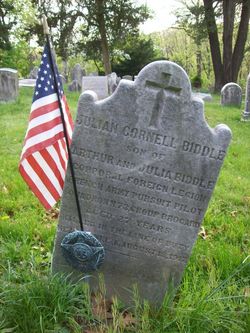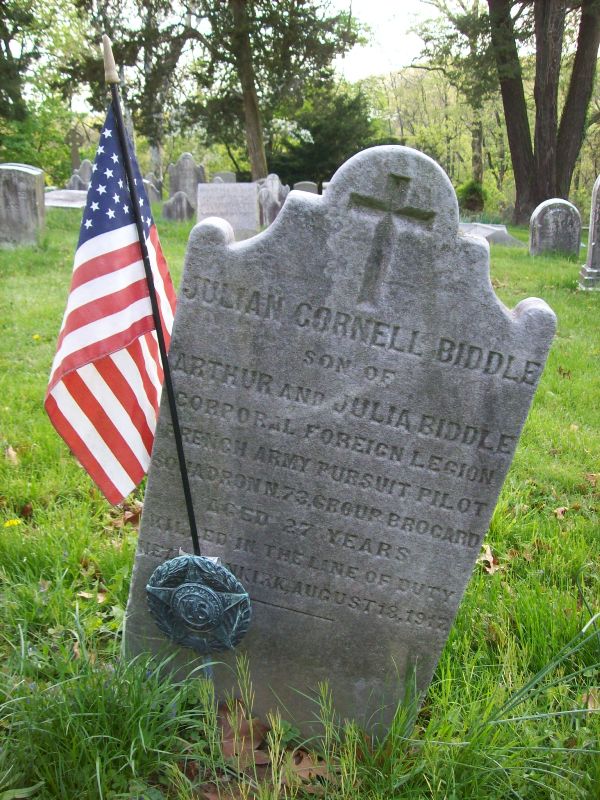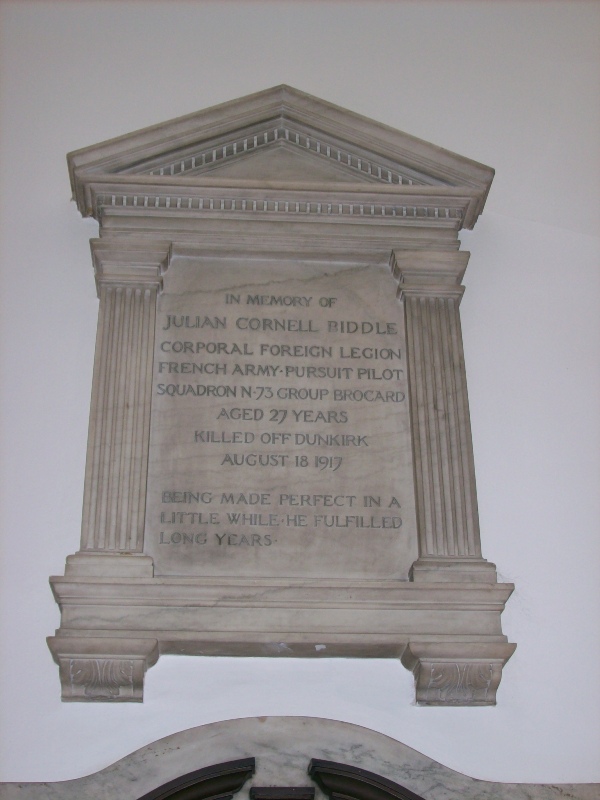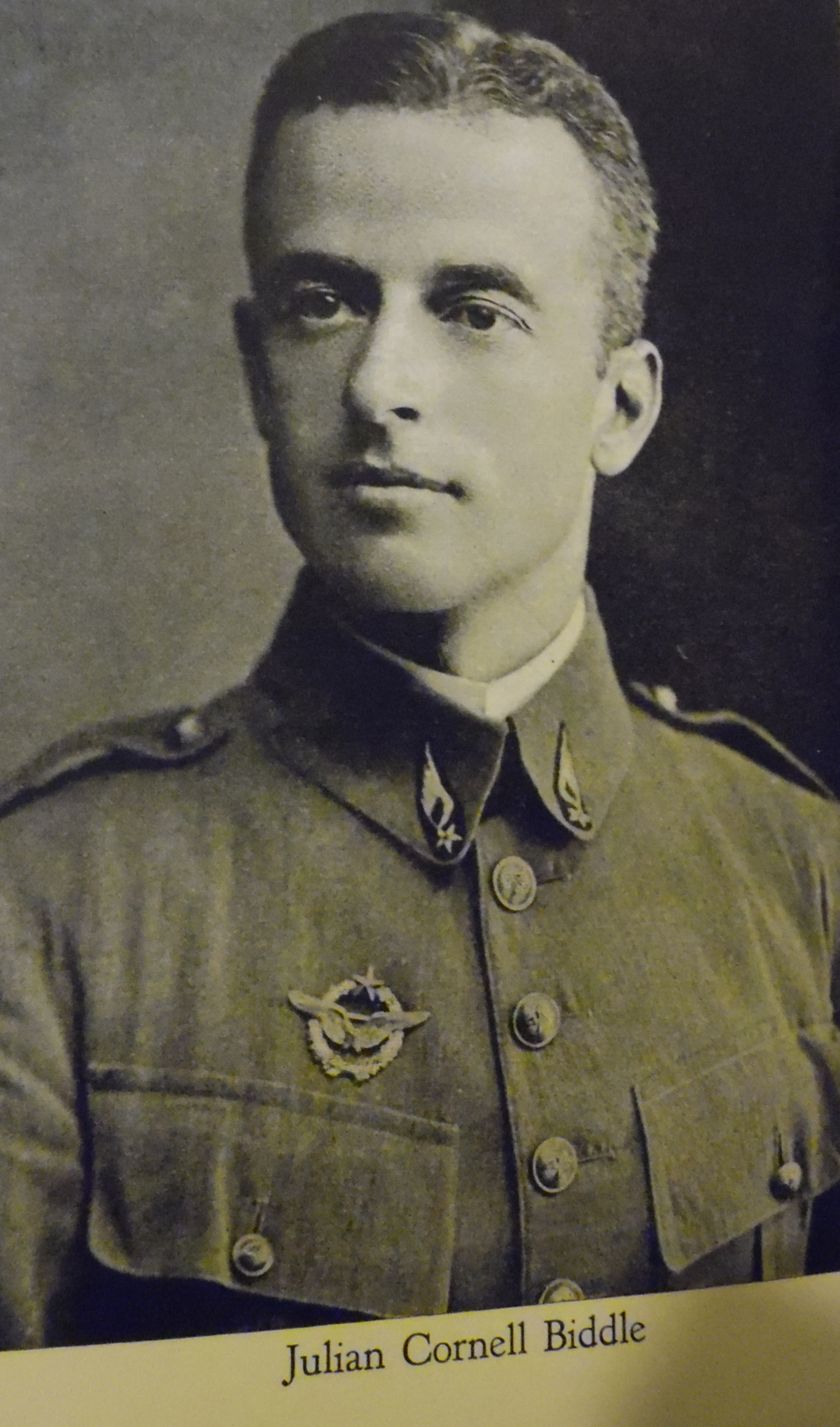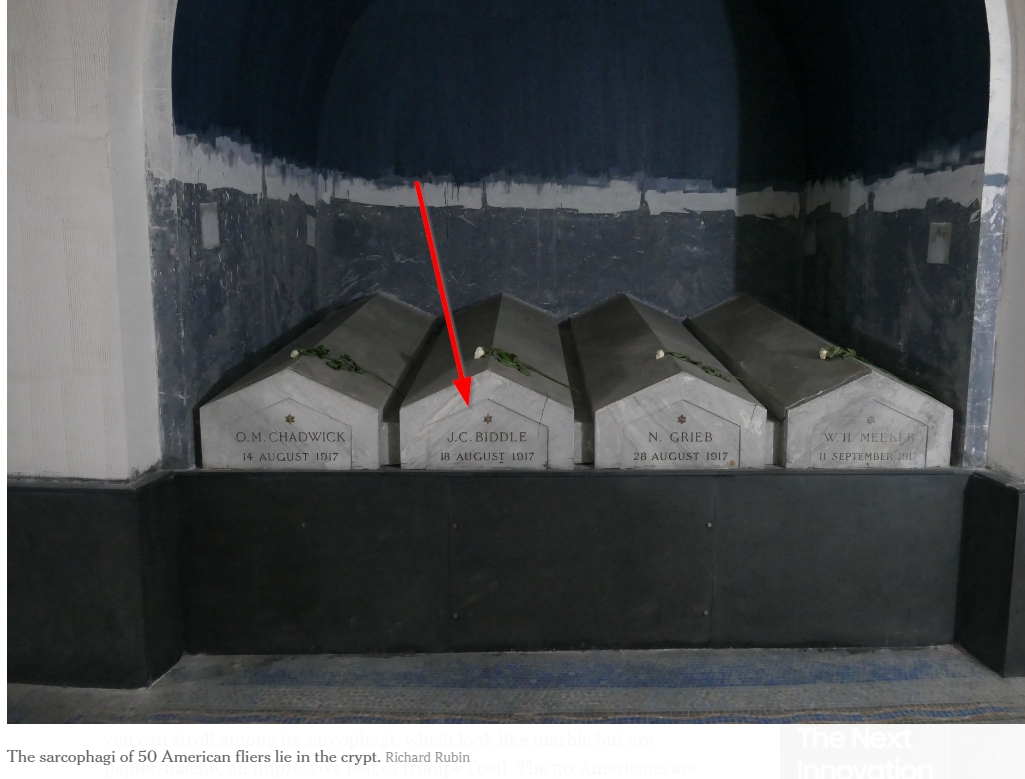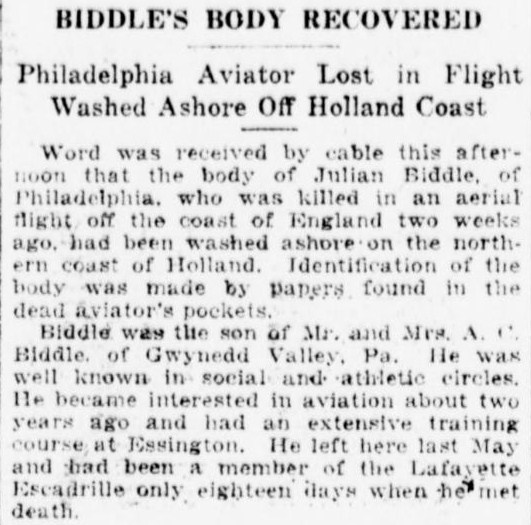The following bio can be found at http://www.ourstory.info/library/2-ww1/Benson2/smsWar1.html.
In the summer of 1916 he received his Pilot's license at Essington. He was accepted for enlistment in the Foreign Legion, and was sent to the French Military Aviation School at Avord, where he received his brevet and graduated in a very short time. He was then sent to Pau for acrobatics, and on the thirty-first of July he was ordered to Plessis-Belleville for assignment as a battle pilot. On the seventh of August he was sent to Souilly, and afterwards to Dunkirk, where he was assigned to Escadrille Number 73, Groupe de Combat Number 12. On the eighteenth of August, while he was on a practice flight, his plane fell into the North Sea, from an unknown cause. Eight days later his body was washed ashore at Egmond-aan-Zee, North Holland, where the civil authorities reported that it appeared torn by shot. He was buried in the village churchyard at this place. Biddle appears to have been the first American who volunteered after the United States entered the war to be killed at the front. In January, 1918, he was awarded the Aero Club of America medal "for valor and distinguished services"; and he also received the ribbon of the Lafayette Flying Corps. His citation is in the Journal Officiel of July the seventh, 1919.
Biddle's letters from France indicate wide powers of observation, and draw unusually clear pictures of the feverish action and changing circumstances of Paris during the trying months of hurry and distress. He does not conceal the dangers of his task, but thereby proves his superiority to them; and his interest and enthusiasm for his work pervade everything that he writes. Throughout these letters run also the self-reliance and frankness which are so familiar to his friends, whether in facing strange situations or applying himself to his own training. He was able to enjoy whatever social distractions circumstances offered, and dwells with great interest on the chance meetings with friends and fellow-soldiers from home.
Julian Biddle was conspicuous among his schoolmates at St. Mark's for his two characteristics of fearlessness and determination. He, like Mandell, was unaffected by popular opinion as such: he saw clearly beyond the external shows of school spirit and loyalty, and worked hard and impersonally to justify them.
Difficulties meant nothing to him, and whatever opposition he encountered in his straightforward course not only failed to turn him, but did not even disturb him. Such strength of purpose might have been perplexing if it had ever been used capriciously; but it was not. He seems to have had from his early boyhood a solid basis of right thinking, entirely detached from considerations of self, and dedicated to pure principle. When this loyalty was transferred, or rather enlarged, to embrace the duty to his country, it flowered into extraordinary activity and practical efficiency. Five hours of flying won him his Pilot's license, and upon arriving at the flying school at Avord he received his commission in record time. The exact circumstances of his death are not known; but those who know him know that whatever they were, he encountered them as he had encountered everything in his brave life, without a disturbing thought or an instant's hesitation. In his will he showed his love and devotion to his School by leaving to her everything that he had earned in his business since his graduation; but in his life he left St. Mark's far more than money can ever buy: an example of clean loyalty, service, and unfailing sincerity and love.
The following bio can be found at http://www.ourstory.info/library/2-ww1/Benson2/smsWar1.html.
In the summer of 1916 he received his Pilot's license at Essington. He was accepted for enlistment in the Foreign Legion, and was sent to the French Military Aviation School at Avord, where he received his brevet and graduated in a very short time. He was then sent to Pau for acrobatics, and on the thirty-first of July he was ordered to Plessis-Belleville for assignment as a battle pilot. On the seventh of August he was sent to Souilly, and afterwards to Dunkirk, where he was assigned to Escadrille Number 73, Groupe de Combat Number 12. On the eighteenth of August, while he was on a practice flight, his plane fell into the North Sea, from an unknown cause. Eight days later his body was washed ashore at Egmond-aan-Zee, North Holland, where the civil authorities reported that it appeared torn by shot. He was buried in the village churchyard at this place. Biddle appears to have been the first American who volunteered after the United States entered the war to be killed at the front. In January, 1918, he was awarded the Aero Club of America medal "for valor and distinguished services"; and he also received the ribbon of the Lafayette Flying Corps. His citation is in the Journal Officiel of July the seventh, 1919.
Biddle's letters from France indicate wide powers of observation, and draw unusually clear pictures of the feverish action and changing circumstances of Paris during the trying months of hurry and distress. He does not conceal the dangers of his task, but thereby proves his superiority to them; and his interest and enthusiasm for his work pervade everything that he writes. Throughout these letters run also the self-reliance and frankness which are so familiar to his friends, whether in facing strange situations or applying himself to his own training. He was able to enjoy whatever social distractions circumstances offered, and dwells with great interest on the chance meetings with friends and fellow-soldiers from home.
Julian Biddle was conspicuous among his schoolmates at St. Mark's for his two characteristics of fearlessness and determination. He, like Mandell, was unaffected by popular opinion as such: he saw clearly beyond the external shows of school spirit and loyalty, and worked hard and impersonally to justify them.
Difficulties meant nothing to him, and whatever opposition he encountered in his straightforward course not only failed to turn him, but did not even disturb him. Such strength of purpose might have been perplexing if it had ever been used capriciously; but it was not. He seems to have had from his early boyhood a solid basis of right thinking, entirely detached from considerations of self, and dedicated to pure principle. When this loyalty was transferred, or rather enlarged, to embrace the duty to his country, it flowered into extraordinary activity and practical efficiency. Five hours of flying won him his Pilot's license, and upon arriving at the flying school at Avord he received his commission in record time. The exact circumstances of his death are not known; but those who know him know that whatever they were, he encountered them as he had encountered everything in his brave life, without a disturbing thought or an instant's hesitation. In his will he showed his love and devotion to his School by leaving to her everything that he had earned in his business since his graduation; but in his life he left St. Mark's far more than money can ever buy: an example of clean loyalty, service, and unfailing sincerity and love.
Family Members
Sponsored by Ancestry
Advertisement
Records on Ancestry
-
North America, Family Histories, 1500-2000
-
1910 United States Federal Census
-
1900 United States Federal Census
-
Pennsylvania, U.S., Episcopal Diocese of Pennsylvania Church Records, 1759-1970
-
Global, Find a Grave® Index for Burials at Sea and other Select Burial Locations, 1300s-Current
Sponsored by Ancestry
Advertisement
